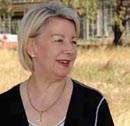“It has been a very rewarding career. I enjoyed my interaction with the people, the patients, the colleagues I worked with, the nurses, the doctors, and people in general in other fields. It’s just amazing; what a profession. I really feel I’m blessed.”
The reflections of one of 20 medical practitioners interviewed by a Charles Sturt University (CSU) academic for an oral history of the experiences of rural doctors over the past 50 years.
The general practitioners and specialists from Wagga Wagga were interviewed by Associate Professor Sue McAlpin, a rural allied health professional from the School of Dentistry and Health Sciences at CSU about their families, medical training, challenges of a rural practice and career highlights.
 “This oral history of medical practice in Wagga Wagga dates back to the 1950s and the doctors are aged from their late sixties to 90 years,” said Professor McAlpin.
“This oral history of medical practice in Wagga Wagga dates back to the 1950s and the doctors are aged from their late sixties to 90 years,” said Professor McAlpin. “What is unique about my research is that the spoken word is preserved. The project captures the rich texture of their voices. Words are emphasised; there are powerful silences and pauses as well as laughter, excitement and emotion.
“The doctors acknowledge the support provided by their wives throughout their rural practice. They managed the families while their husbands worked long hours, sometimes on call seven days a week. The challenge for doctors working in rural and regional Australia today is finding rewarding career options for their partners.
“What is also clear from the interviews is the changing nature of medical practice. Once general practitioners performed a range of activities such as anesthetics, midwifery and surgery but this has now changed with the emergence of the specialist medical intervention,” said Professor McAlpin.
All the doctors in the study agreed for the CD collection and interview transcripts to be made available to the public. They will be kept in the CSU Regional Archives.
Archives Manager Mr Wayne Doubleday said, “This collection will be a very valuable addition to the Archives. Oral histories give historians and researchers a new and different perspective on the past, which may not otherwise be available through a traditional historical record such as a document or photograph. A person’s voice recounting events can be a very emotive and powerful tool.
“The CSU Regional Archives has only a handful of oral history collections and a very small number of records from medical practitioners, so this collection of oral histories documenting the experiences of doctors in a rural setting will prove to be both significant and invaluable in the years to come.
“What is also crucial is that the participants in Sue’s research have allowed their personal recollections and stories to be open to the public. This will no doubt facilitate greater interest and further research in the future.”
Twelve of the 20 doctors will attend a ceremony in their honour hosted by the Head of Campus at CSU in Wagga Wagga, Mr Adrian Lindner from 12noon on Tuesday 25 October.
The project, The Voices of the Past – Oral History Collection of Health Professional Experiences from the Riverina and Beyond received financial support from the University’s Centre for Inland Health.





Social
Explore the world of social